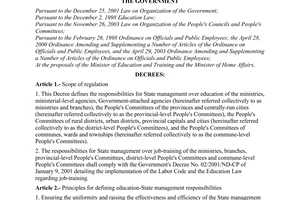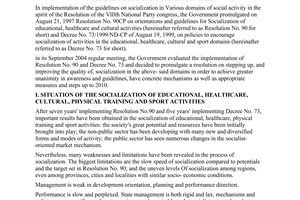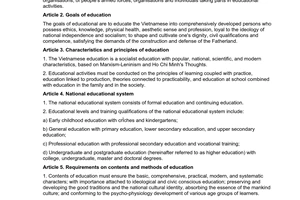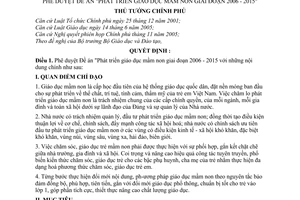Nội dung toàn văn Decision No. 149/2006/QD-TTg of June 23, 2006 approving the scheme on preschool education development in the 2006-2015 period
|
THE
PRIME MINISTER OF GOVERNMENT |
SOCIALIST
REPUBLIC OF VIET NAM |
|
No: 149/2006/QD-TTg |
Hanoi, June 23, 2006 |
DECISION
APPROVING THE SCHEME ON PRESCHOOL EDUCATION DEVELOPMENT IN THE 2006-2015 PERIOD
THE PRIME MINISTER
Pursuant to the December 25, 2001 Law on
Organization of the Government;
Pursuant to the June 14, 2005 Education Law;
Pursuant to the Resolution of the Government's November 2005 meeting;
At the proposal of the Minister of Education and Training,
DECIDES:
Article 1.- To approve the scheme on preschool education development in the 2006-2015 period with the following principal contents:
I. GUIDING VIEWPOINTS
1. Preschool education is the first educational level of the national education system, laying the primary foundation for physical, intellectual, emotional and aesthetic development of Vietnamese children. Taking care of preschool education development is a common responsibility of local administrations at all levels, branches, families and the entire society under the Party leadership and the State management.
2. The State shall manage and make development investment in preschool education and, at the same time, adopt favorable mechanisms and policies for stepping up the socialization of preschool education; apply policies to prioritize investment in preschool education development in regions meeting with socio-economic difficulties and exceptional socio-economic difficulties as well as in mountainous, deep-lying, remote, island and border areas.
3. The preschool children care and education should see close coordination and combination among schools, families and society. To attach importance to, and raise the effectiveness of, the communication and dissemination of knowledge of child care and education to parents with a view to diversifying modes of child care and education.
4. To step by step renew preschool education contents and methods to become compatible, appropriate, advanced and integrated with renewal of general education, properly preparing children for first grade, making active and practical contributions to raising education quality.
II. OBJECTIVES
1. General objectives:
To develop preschool education with a view to making substantial, steady and comprehensive improvements in the quality of child rearing, care and education; to consolidate and expand networks of preschool education institutions, paying special attention to regions inhabited by ethnic minority people and regions meeting with exceptional socio-economic difficulties as well as mountainous, deep-lying, remote, border and island areas; to diversify care and education modes; to ensure benefits and policies for preschool teachers according to regulations. To strive for the target that by 2010, most children shall be cared and educated in appropriate forms, and the child malnutrition rate shall be reduced.
2. Specific objectives:
a/ To train and retrain preschool teachers to improve their quality, striving for the target that 80% of teachers will reach qualification standards by 2010 and 100% by 2015, 8% of them will have above-standard degrees by 2010 and 15%, by 2015;
b/ To consolidate and expand networks of schools and classrooms, increasing the rate of under-three children going to crches and baby-sitting groups from 15% in 2005 to 20% by 2010 and 30% by 2015; the rate of children aged between 3 and 5 years going to kindergartens from 58% in 2005 to 67% by 2010, and 75% by 2015; the rate of 5-year-old children going to kindergartens from 92% in 2005 to 95% by 2010, and 99% by 2015;
c/ To increase the rate of preschool education institutions meeting national standard from 9% in 2005 to 20% by 2010 and 50% by 2015;
d/ For regions meeting with exceptional socio-economic difficulties as well as mountainous, deep-lying, remote, border and island areas: to increase the rate of children aged between 3 and 5 years going to kindergartens from 43% in 2005 to 55% by 2010 and 62% by 2015. To strive for the target that the rate of 5-year-old children in these regions and areas going to kindergartens shall be up to the national average level;
To strengthen and perfect preschool education institutions in regions meeting with exceptional socio-economic difficulties as well as mountainous, deep-lying, remote, border and island areas. From 2006 to 2010, to invest in material foundations, teaching equipment and teacher training up to standards for around 2,500 preschool education institutions in these regions and areas; to draw up investment plans on training and retraining of around 3,000 teachers to have standard qualifications.
e/ To raise the quality of child rearing, care and education in preschool education institutions, striving for the rate of children meeting development standards of 80% by 2010 and 95% by 2015, reducing the rate of malnourished children at preschool education institutions to below 12% by 2010 and under 10% by 2015;
f/ To increase the rate of parents who are provided with basic knowledge of child care, rearing and education to 70% by 2010 and 90% by 2015.
III. TASKS AND SOLUTIONS
1. Building of contingents of preschool teachers and educational administrators and improvement of their quality
a/ To direct and perform preschool education tasks specified in the Prime Minister's Decision No. 09/2005/QD-TTg of January 11, 2005, approving the scheme on building, and raising the quality of, contingents of teachers and educational administrators in the 2005-2010 period;
b/ To make plans on training and retraining of preschool teachers and educational administrators in each period, in each locality and nationwide; to consolidate and re-plan preschool teacher-training establishments in line with the general planning on their network;
c/ To renew and perfect contents, curricula and methods of training preschool teachers of intermediate, college and university degrees to suit the country's requirements and practical conditions and international integration;
d/ To formulate programs and plans on regular retraining and training preschool teachers up to standards and raise their standards in response to the requirements of each region and each locality;
e/ To guide the application of benefits and policies toward preschool teachers strictly according to state regulations, especially social insurance, health insurance and wage regimes; to elaborate policies to ensure equality between teachers working in public preschool education institutions and in non-public ones.
2. Renewal of the preschool education program, contents and methods
a/ To develop and carry out the new preschool education program in the direction of integrating topic-based care and education activities; organizing different activities for children, especially playing activities suitable to their ages' psychological and physiological development as well as the requirements of child rearing, care and education;
b/ To improve the monitoring and assessment of child development quality;
c/ To supply more equipment and toys in service of the renewal of the preschool education program and methods. To provide games and toy kits familiarizing children with informatics and foreign languages so that by 2010, around one-third of preschool education institutions shall have access to informatics and foreign languages;
d/ To compile documents guiding the new preschool education program, paying attention to the teaching of Vietnamese to children in ethnic minority regions.
3. Formulation and perfection of a planning on the network of preschool education institutions, further investment in their material foundations
a/ To elaborate a planning on development of preschool education institution networks in localities to meet the demands and suit the conditions of each locality;
b/ Preschool education institutions shall be established in three forms: public, people-founded and private. Public ones shall be set up mainly in regions meeting with exceptional socio-economic difficulties;
To transform semi-public preschool education institutions into people-founded or private ones according to the provisions of law. To encourage the establishment of private preschool education institutions.
c/ Funds shall be prioritized for investment in building public preschool education institutions in regions meeting with exceptional socio-economic difficulties and regions inhabited by ethnic minority people, ensuring that each commune shall have at least one preschool education institution and that children shall be able to follow the kindergarten program designed for five-year-old children before entering the first grade;
d/ To improve material foundations, and increase equipment and toys to ensure the progress and quality of implementation of the new preschool education program.
4. Supplementation and perfection of benefits and policies and acceleration of the socialization in preschool education
a/ To continue implementing and, at the same time study, supplement and perfect preschool education development policies specified in the Prime Minister's Decision No. 161/2002/QD-TTg of November 15, 2002. The State shall give supports so that teachers working at people-founded preschool education institutions can enjoy wages not lower than the minimum wage level set by the State, insurance and other benefits like teachers at public institutions; and support regular training and retraining of teachers of private preschool education institutions;
b/ Private preschool education institutions shall ensure that their teaching staff receive wages not lower than those paid to teachers working at public and people-founded preschool education institutions and enjoy insurance and other benefits and policies applicable to teachers according to regulations;
The State shall adopt policies to encourage the manufacture of toys and equipment in service of the renewal of the preschool education program.
c/ To thoroughly peform the socialization work in the spirit of Resolution No. 05/2005/NQ-CP of April 18, 2005, on stepping up socialization of educational, healthcare, cultural, and physical training and sport activities. To encourage, mobilize and facilitate social organizations, socio-professional organizations, economic organizations and individuals at home and abroad to invest in preschool education development;
d/ To improve the allocation of state budget expenditures for preschool education in the direction of making allocations in proportion to the number of preschool-age children in each locality.
5. Raising of awareness about, and promotion of information and communication on, preschool education
a/ To raise the awareness of Party committees and administrations at all levels as well as communities and families about the role and position of preschool education in the national education system and in human resource development;
b/ To enhance the responsibility of Party committees, state management agencies and local administrations at all levels in directing and organizing the work of preschool education information and communication;
c/ To draw up information and communication plans, compile and supply documents in order to disseminate basic knowledge and skills of preschool child rearing, care and education, create conditions for socio-political organizations, socio-professional organizations, parents and the entire society to participate in preschool education development.
6. Enhancement of preschool education administration and international cooperation
a/ To thoroughly decentralize education administration in the spirit of the Government's Decree No. 166/2004/ND-CP of September 16, 2004, defining responsibilities of state management of education. The Ministry of Education and Training shall manage education according to its assigned functions and tasks, concentrating efforts on properly performing tasks of elaborating development strategies and plans, mechanisms, policies and working regulations, and managing, inspecting, examining and assessing preschool education quality;
b/ To formulate a mechanism to ensure closely coordinated management, information and communication between the Ministry of Education and Training and ministries, branches and localities in preschool child care and education;
c/ To step up, and raise the effectiveness of, international cooperation; to attract investment and aid sources from UNICEF, UNESCO, WB and ADB, domestic and foreign non-governmental organizations.
IV. CAPITAL SOURCES
Sources of investment capital for preschool education development include:
- State budget capital included in annual national target programs and regular expenditure estimates according to the budget management decentralization;
- Other lawful capital sources.
Article 2.- Organization of implementation
1. The Ministry of Education and Training shall:
a/ Assume the prime responsibility for, and coordinate with ministries, branches and localities in, directing, guiding and formulating detailed programs and schemes, concretizing this scheme's contents for implementation;
b/ Coordinate with the Ministry of Planning and Investment in formulating an investment program according to the preschool education development objectives for implementation within the national target program on education in the 2006-2010 period and submit it to the Prime Minister for consideration and approval;
c/ Supervise and inspect, regularly assess and review implementation results of the scheme, and periodically report thereon to the Government or the Prime Minister.
2. The Committee for Population, Family and Children shall:
a/ Assume the prime responsibility for, and coordinate with the Ministry of Education and Training in, supervising activities related to the protection of child rights in the preschool education domain;
b/ Coordinate with the Ministry of Education and Training, ministries, agencies and localities in implementing communication programs for mobilizing the entire society to participate in preschool education development;
c/ Formulate family and child-related mechanisms and policies in service of preschool education development objectives.
3. The Ministry of Planning and Investment shall:
a/ Assume the prime responsibility for, and coordinate with the Ministry of Education and Training in, reviewing and evaluating the preschool education investment program under the national target program on education in the 2006-2010 period, and submit it to the Prime Minister for approval;
b/ Coordinate with the Ministry of Finance and the Ministry of Education and Training in elaborating annual preschool education investment plans for localities; and to improve the allocation of regular budget expenditures.
4. The Ministry of Finance shall:
a/ Allocate regular budgets according to programs and objectives of expenditures for preschool education to ensure the objectives and execution progress of the scheme; enhance financial inspection and examination according to the provisions of the State Budget Law;
b/ Assume the prime responsibility for, and coordinate with concerned ministries and agencies in, studying and improving the budget allocation; add and perfect necessary financial mechanisms and policies for preschool education development.
5. The Ministry of Home Affairs shall study, amend and supplement mechanisms and policies on payrolls of preschool teachers and educational administrators at educational institutions of various types.
6. The Ministry of Health shall:
a/ Assume the prime responsibility for planning and carrying out programs on vaccination and disease prevention for children; coordinate with the Ministry of Education and Training in formulating and perfecting medical service, healthcare and nutrition programs for integration into the training and retraining of preschool teachers.
b/ Coordinate with the Ministry of Education and Training in disseminating knowledge and skills and providing home-based child care and education services.
7. The Ministry of Labor, War Invalids and Social Affairs shall assume the prime responsibility for, and coordinate with the Ministry of Education and Training in, directing and supervising the implementation of social and health insurance regimes as well as other social policies toward preschool teachers and children.
8. People's Committees at all levels shall:
a/ Formulate programs and schemes concretizing this scheme's objectives, tasks and solutions for direction and implementation in their respective localities;
b/ Direct the planning and building of preschool education institution networks, the elaboration of plans on training preschool teachers and mobilizing children to go to preschools in each period in their respective localities, which are suitable to their socio-economic conditions;
c/ Direct the investment in material foundations, equipment and toys in service of the new preschool education program; to apply preferential policies to develop preschool education in their respective localities; to ensure the allocation of budgets for preschool education strictly according to current regulations;
d/ Direct the application of regimes and policies to teachers at preschool education institutions of various types in their respective localities strictly according to the Stat's regulations.
9. The Government hereby requests the Vietnam Fatherland Front, the Vietnam Women's Union, the Vietnam Study Promotion Society and mass organizations to actively participate in developing preschool education and mobilizing children to go to crches and kindergartens; and enhance the dissemination of child care and education knowledge to each family.
Article 3.- This Decision takes effect 15 days after its publication in "CONG BAO."
Article 4.- Ministers, heads of ministerial-level agencies, heads of Government-attached agencies, and presidents of provincial/municipal People's Committees shall have to implement this Decision.




